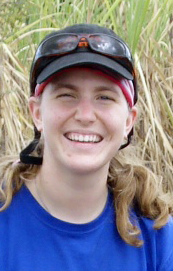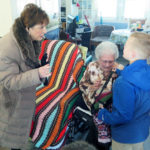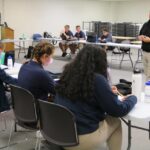By Jenna Ebener
I have been a school social worker for one year now at a school for children with medical, physical and cognitive impairments. When I tell people what I do, I often get the exclamation: “I don’t know how you do it!” I respond that everyone has their niche. God laid out a path for me that, through his guidance and redirection, I have been blessed enough to find. I knew my school was “the one” from the phone interview. However, I truly realized I was with the population God meant for me to be with when I spent an hour in the hallway with a student the first week of school.

It is not uncommon for our students who are able to walk to suddenly drop to the floor during transitions in the school day. Since most of our students are nonverbal communicators, this response is their way of communicating that they want to avoid the activity, want access to something else or enjoy the attention or sensory stimulation (e.g., the feel of the floor against their hands).
When our students drop to the floor, we need to determine the behavior’s function and how to motivate them in a way that does not reinforce the behavior. Since I was new and it was the first week of school, I was attempting to determine why this particular student had dropped to the floor. More importantly, I was working with other staff to attempt to find ways to motivate her to continue walking on her own. As the time in the hallway lingered to a half-hour and then 45 minutes, I realized that I was not frustrated in the slightest. Yes, I wanted to get her to class, and I wanted to help however I could, but I was not worried about the passing time. My focus was solely on this student and the interventions our team was attempting.
After further reflection, I recognized that this lack of frustration was largely due to the reasons behind this student’s behavior. She did not drop to the floor to spite me or others; rather, she was communicating in the only way she knew how in that moment that she wanted something different. Instead of getting angry at the situation, this experience solidified my compassion for her and my determination to work with her team to determine how we could help her communicate more effectively.
I was struck by this revelation continually throughout the year. Time and time again, I find myself in situations where I end up with a student for long periods of time either as a result of being with the student or volunteering to give someone else a break. To get upset in these situations would mean not only impacting my well-being, but also our students’ well-being. They know when we get frustrated, which in turn affects how they respond to us.
As a result, I enjoy these tests of patience and use the opportunities to pray to God for guidance and a calm demeanor so I can get through to the students quicker. While I am generally a patient person, I am not patient in every situation and know that I would respond differently to different populations. In that moment with that first student in the hallway, I had the understanding that God has blessed me with patience for this particular population. I know that I am there to be a calm helper for these students who want to be understood. I am following God’s path, which makes it that much easier to explain how I “do it.”
(Jenna Ebener graduated in 2015 with a Master of Social Work from St. Ambrose University in Davenport.)











